Stay in the know on all smart updates of your favorite topics.
Moving from a linear to a circular economy means minimising the waste and pollution by reducing, recycling and reusing. The City of Amsterdam aims to redesign twenty product- or material chains. The implementation of material reuse strategies has the potential to create a value of €85 million per year within the construction sector and €150 million per year with more efficient organic residual streams. Amsterdam set up an innovation program on the circular economy; www.amsterdamsmartcity.com/circularamsterdam. By converting waste into electricity, urban heating and construction materials, the Amsterdam Electricity Company generates 900 kWh per 1000 kg of waste. 75% of the sewage system is separated for waste and rain water and the silt which remains after treating waste water is converted into natural gas. Share your innovative concepts and ideas on circular economy here.
Circulaire Werkplaats

Hebben jullie nog een kapotte bureaustoel in een hoek staan? Of een stapel gordijnen waar je niets mee kunt? Stapels oude keyboards die liggen te verstoffen?
Wij organiseren een Circulaire Werkplaats tijdens de Week van de Circulaire Economie 2020.
Breng jouw kantoorfrustratie mee, en samen met haar netwerk-partners gaat Furnify aan de slag om een oplossing te bedenken voor jouw item.
Meld je aan via info@furnify.nl en we zien je graag op 6 februari in NewMetropolisZuidoost.
CEDaCI – Circular Economy for the Data Center Industry

The Data Centre Industry has grown rapidly and generates a large volume of e-waste / WEEE. The current infrastructure for dealing with this waste is underdeveloped and consequently, there is a real and urgent need to address this now. CEDaCI will build a Circular Economy for the Data Centre Industry by bringing together stakeholders from all equipment life cycle stages to turn this waste into a useful resource and support the ongoing rapid growth of the DCI.
2020 the year (and decade) to Start Smart
We created a few weeks ago the platform StartSmart.city.
StartSmart.city is a special incubation/acceleration program specifically designed to support and invest in cities and startups that develop projects directly or indirectly related to smart cities to strengthen the social and economic fabric of the territory.
StartSmart.city was created with the goal of supporting and contributing to the progress of cities by attracting and retaining talent and entrepreneurs by providing different and alternative channels for access to investment and financing.
I hope you can reach us in 2020!
Let’s go together to a different dimension of smartness.🚀
Bring it on 2020! 🏄
Rijkswaterstaat: Climate-neutral and Circular Procurement
The Netherlands has high policy ambitions to become 100% circular by 2050, and consume 50% less primary raw materials in 2030. Public procurement can be an incredibly powerful tool, and the Dutch government sees climate-neutral and circular procurement as a means to achieve significant CO2 reductions. However, a framework to quickly and easily assess what is green, circular and climate-neutral can be challenging.
Metabolic proposed a framework for impact measurement of Green Public Procurement, did an analysis of the current state of impact measurement and developed a roadmap towards a harmonized model for the public sector in the Netherlands. We approached the study on three different levels: the level of a product group, the level of an organization and the level of national reporting. Subsequently, we developed a roadmap with actions that should be taken in the coming 5 years in order to arrive at a more uniform impact monitoring for climate-neutral and circular procurement.
Implementation of the roadmap produced in the study will help the Dutch government develop a clear monitoring framework that helps public organizations compare purchase options and make sustainable purchasing decisions more easily.
Sorry for the delay.....
But here is a new edition in the series 'Looking for the humane city'. Topic today: Circular cities, or how to escape the take-make-waste economy.
In case you prefer this article in Dutch (already published last month): De Kringloopstad hmjvandenbosch.com/2019/12/16/de-kringloop-stad/
Nordic Circular Economy Summit 2020

Business leaders and other experts from the European Commission, Holland Cicular Hotspot, Rang-Sells, Amager Resource Center, Neste, Aker Solutions and more will be sharing experiences, solutions and creating new possibilities for business partnerships. This Summit will give an opportunity to strengthen the ties between the Nordics and the Netherlands in the field of Circular Economy. This event is offered free of charge registration is, however, required.
KASKANTINE 4.0

The Kaskantine will implement together with the neighboorhood its design for closing local resource loops: a kitchen with closed water cycle, preventing local food waste, introduce neighbourhood composting, and organise repair cafe's, sport and musique workshops, etc. Data will be gathered to monitor the resource cycling and methods will be tested to make it more socially and culturally inclusive.
User-created nature-based solutions in an urban environment;
The case of the KasKantine (Greenhouse Cantina), Amsterdam
Historically landscape architecture and infrastructural planning have assigned physical separated functions to landscape in order to upscale and manage resource flows cost efficiently. Rather than monosectoral and large scale linear production systems we can now see a shift to decentralized and locally integrated solutions to close resource loops. In these solutions also citizens can play a more (pro)active role. After being more prominent in rural areas, landscape architecture is now also more active as a lead design principle in urban neighbourhoods. Local integrated solutions for resource cycling efficiency give rise to multiple value production rather than to an increase of local financial income. Either way it increases citizen driven (semi)professional activities in resource management in urban neighbourhoods, as well in its creation and in management.
We see enormous potential in this approach: it can reconnect citizens to nature, it can facilitate in changing lifestyles AND produce the right technology to face our climate and resource crisis. But before it can become mainstream, we see the following challenges and questions, mainly to do with creating sufficient local political support and accessibility to these technological and economic opportunities.
- How can actors on local level on one side and central sectoral level at the other side co-create and redesign effectively the landscape, necessary to close resource loops locally with sufficient democratic legitimacy?
- How could citizen-driven services in resource management be held accountable to a broader public and the public sector?
- How can these nature-based solutions be culturally and socially inclusive?
- How can socio-economically marginal(ized|) groups profit from this increased multiple-values production?
We can try to answer those questions for one specific case to see how it could work out in practice. The Kaskantine is a not-for-profit volunteer driven garden- restaurant - food coop which has as its main objective to show that more autonomous, off the grid nature based solutions for climate adaptive working and living in urban areas are possible and can be at the same time a new lifestyle. It is a small village of refurbished shipping containers, recycled greenhouses and (roof top)gardens. The Kaskantine is currently being built on its fourth location and is negotiating a 7 years ground lease with the municipality of Amsterdam.
The Kaskantine managed to grow from only one container and a one-man company, 5 years ago, to a cooperative with over 30 volunteers with 13 containers. A second village is being planned of 7 containers in the east of Amsterdam. This has been realised without any external capital investment or subsidies. The strategy has always been: find a solution with the least possible financial costs and turn untapped local resources into value.
In doing so the Kaskantine discovered that although real estate prices in Amsterdam skyrocket, there is still a lot of underutilised land and water, that is without use for people and for nature. Lots of plots are “waiting” to be developed, or are underdeveloped: for one function while there could be double or triple functionalities. We could call this “real estate waste”. The Kaskantine could use land for free because there was no direct market value of that land. And the same counts for other important resources: (rain)water, (solar)energy, food (waste and own production), labour (volunteers) and (natural and waste) materials. The Kaskantine is able to operate with zero fixed costs and therefore able to survive.
Furthermore, with its installations it is trying to integrate all received good and services in local loops. Maximum in, minimum out. This is optimized by integrating different resource loops in one management system.
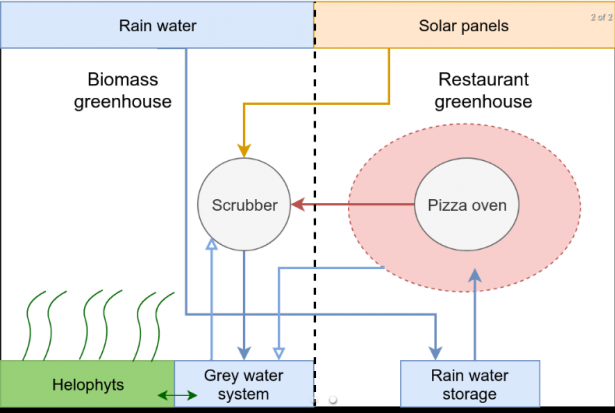
An abundance of one flow of resources can be absorbed by other resource cycles: Peak solar energy can be used in extra ventilation, aeration and irrigation. Sudden food surpluses are redistributed for free and create network solidarity. The Kaskantine is also able to use resources in all phases of their life cycle, like wood: from construction to fire wood. Or being able by using rest heat in storing it in mass or other spaces, or filtering waste water for irrigation. We call this adaptive capacity: the capacity to buffer abundance and use it later or in an alternative way.
Finally, an alternative lifestyle is embraced, one that is appreciating the value of abundance of local resources, rather than the value of market choice.
We could argue that the Kaskantine is thriving in an alternative economy, that can exist thanks to and despite of the mainstream economy that they are trying to transform. We call this abundance or give economy, in contrast with economy based on consumption and the organisation of scarcity.
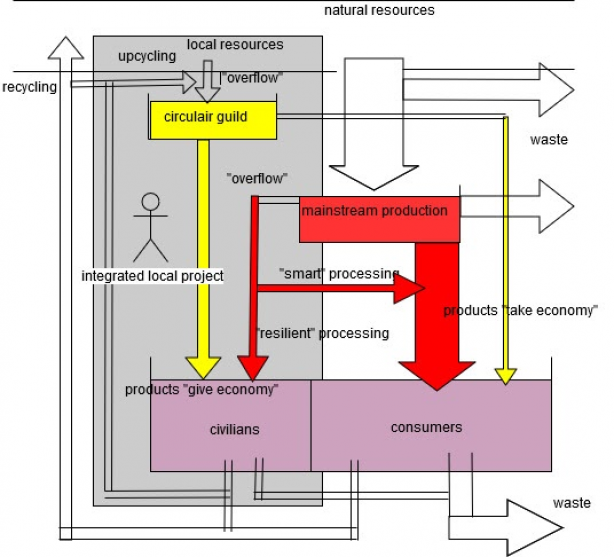
Abundance economy as being a sum of relatively autonomous integrated projects in mainstream economy.
Because of its ability to expand autonomously within mainstream economy, and because its abundance economy is not a zero-sum game as long as local resources and waste are underutilised, the Kaskantine is very open for participation. There is no economic argument against including more neighborhood activities, on the contrary. More participation seems therefore to depend more on the capability of cultural inclusiveness: if people feel comfortable within the network of the Kaskantine, or if people feel comfortable to start a sort of “kaskantine” on their own.
First, the opportunity to integrate has been ”built in” into the design of the Kaskantine by a step-in approach. From experience as a guest (exchange, tasting, get inspired, etc) to participation in the design, creation and operation of the Kaskantine and Kaskantine related projects.
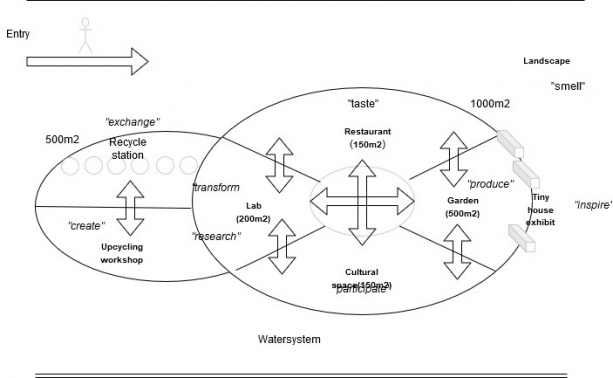
Secondly, the Kaskantine is also active in the neighbourhood centre and within a network of community organisations, with a step-out approach. In this case the Kaskantine offers through free workshops a learning curve to adopt small scale installations, like vertical gardens and worm composting, and participate in food saving and storage at home in order to take a step back from mainstream economy into the abundance economy.
An important ambition of the Kaskantine is to negotiate with the municipality a land lease contract in which the landuser takes responsibility for its development and environmental control of the land. This cheaper land rent will hopefully give other “kaskantines” the opportunity to arise.
The Kaskantine has free energy to spend on helping other groups in joining this movement because it can operate autonomously and with low fixed costs. This creates hopeful opportunities for inclusiveness of the proposed solutions. Whether this is done in some kind of co-creation with more central institutions depends more on their own capability to work with local small scale initiatives and on their willingness to change or compensate the negative effects of their lineair production models and on their willingness and capability to change sectoral into integrated policies.
Become a Circular Entrepreneur

Around the First European Upcycle Centre in Almere De Steiger you see what happens when you base your activities on the assumption that ‘waste’ is a human invention. Many innovative entrepreneurs are setting up their new businesses re-using materials and thinking in a collaborative way. Learn how we ended up in the Cities as they are today and learn how to become a more circular organisation yourself.
Around the First European Upcycle Centre you see what happens when you base your activities on the assumption that ‘waste’ is a human invention. Many innovative entrepreneurs are setting up their new businesses re-using materials and thinking in a collaborative way. This vibrant and energetic yet circular economy is getting attention of international visitors.
At Almere - De Steiger the first European Upcycle Centre was opened in January 2018. During the short period the centre has opened their doors, it has attracted many people from various backgrounds such as circular economy- and social impact entrepreneurs, designers, craftsmen, tech & Smart City entrepreneurs and many curious visitors from all over the world. Innovation is their daily food.
When you visit Almere De Steiger, or ‘AllyTown’ as the city is sometimes called, you’ll witness what happens when you bring together entrepreneurs with a focus on circular and sustainable business models.
Examples of people you’ll meet are
- Craftsmen, producing unique circular marketing products,
- Craftsmen, producing unique and trendy lamps and furniture,
- Providers of sustainable and circular Smart Energy solutions,
- Designers and Manufacturers of Smart & Sustainable Fashion,
- Innovators sharing knowledge regarding entrepreneurship and new tech,
- Students with a focus on Tech, Sustainability and Circularity
- Smart City Designers & Architects
- ...
During the visit you’ll get an interactive talk of an experienced entrepreneur about innovation and entrepreneurship in a circular economy. Next to that you will go on a tour and visit 2-4 circular entrepreneurs who will explain how they work in this ecosystem, what their product looks like and how they make a living from their circular organisations.
Almere - De Steiger is not just a circular hub, it is a circular economic hub and is slowly becoming an example for others too. Many national and international celebrities have found this area for the unique handcrafted and sustainable products.
A standard visit complies:
- Presentation about the innovation journey to Smart Cities Today
How did we get to the point where the world is today? What trends do we see to make our world more sustainable and what can you do to help? - Interactive sessions with innovative & circular entrepreneurs examples are:
- Total solution for Circular & Sustainable households,
- Unique handcrafted Circular Marketing Materials,
- Smart Fashion (3D)/Circular Fashion,
- Upcycled trendy lamps & furniture
- New Tech developments
The visit can be accommodated to individual requests and can be enriched with sessions such as:
- running circular workshops: how to make your business more circular, learn from experts;
- start-up sessions such as coaching or pitch events;
- run a design sprint to solve complex (business) problems in a sustainable & circular way;
- Learn how to innovate by using new technologies such as Blockchain, Artificial Intelligence, Internet of Things, 3D technologies or Robotics;
- visit the circular ateliers of the local entrepreneurs
Almere De Steiger is easily accessible by both car and public transport and is situated next to the Floriade area.
Want to book the tour? Mail to manuela@krullsolutions.com
Open source hardware project

LET OP: NIEUWE DATUM 10 MAART 2020
DatacenterWorks en CloudWorks organiseren op dinsdag 3 december 2019 een speciaal event dat geheel in het teken staat van open source-hardware en de kansen die dit u als IT-manager, floormanager of datacentermanager biedt. Dit event zal plaatsvinden bij maincubes B.V. te Schiphol-Rijk.
De markt
Nadat open source eerst al de softwaremarkt wist te veroveren (denk aan Linux, OpenStack enz) zien we nu langzaam maar zeker iets vergelijkbaars gebeuren in de hardware-markt. Datacenters waren tot voor kort aangewezen op hardware-producten die volledig op het principe van vendor lock-in zijn gebaseerd. Onder invloed van de hyperscalers (Facebook, Google, Microsoft enz) zien we nu een omgekeerde situatie ontstaan: het datacenter bepaalt welke hardware-producten hij wil hebben en vraagt de industrie deze voor hem te bouwen.
Wie doet wat?
Steeds meer manufacturers stappen in deze nieuwe markt. Maar wie doet nu precies wat? Hebben we het hier enkel over het Open Compute Project (OCP)? Of over meer open source-projecten (hint: ja!). Tijdens dit event meer informatie hierover en krijgt u tevens antwoorden op uw vragen.
- Green IT Amsterdam houdt zich al geruime bezig met projecten op het gebied van energiebesparing en het verkleinen van de ‘environmental footprint’ van datacenters en IT-afdelingen. Open source hardware kan hierbij een belangrijke rol spelen.
Daarom verzorgt Julie Chenadec van Green IT Amsterdam tijdens het Open Source Hardware event dat op 3 december in Amsterdam plaatsvindt een presentatie over de rol die open source hardware kan spelen bij het verkleinen van de impact van datacenters op milieu en omgeving.
In haar presentatie gaat zij onder andere in op het Europese Cedaci-project waaraan Green IT Amsterdam deelneemt.
Ook laat zij zien hoe open source hardware een van de opties is voor datacenters en IT-afdelingen die hun ‘environmental footprint’ verder willen terugdringen.
Interesse om deze presentatie bij te wonen? Kijk hier voor meer informatie.
> https://opensourcehardware.datacenterworks.nl/110219
Circular Solutions: reducing e-waste in mobile phones
Whenever a mobile phone is thrown away, we lose the value of its components but also the value of its production, transportation, and labor. Currently, only 20% of electronic products are formally recycled, while integrated construction makes repairing and reusing electronic components increasingly difficult. Fairphone is attempting not only to recycle, but also to re-use and repair electronic components and source them from ethical supply chains.
Read our interview with Fairphone co-founder Miquel Ballester Salvà to learn what other impacts Fairphone is trying to minimize, what drives them, and where the compnay is is headed.
Amsterdam Smart City partners at Smart City Expo Barcelona part 4: Metabolic
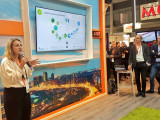
Next week the Amsterdam Smart City team travels, together with a couple of our program partners, to the Smart City Expo World Congress in Barcelona. This is THE leading event for cities in the world. Main goal of the event is to empower cities and collectivize urban innovation across the globe. We asked our partners why they will join the Dutch innovation mission to Barcelona. Now in line: Tamara Streefland, consultant and cities program lead at Metabolic.
Tell us a little bit more about Metabolic!
Metabolic is a consulting, research, and venture building organization focused on tackling global sustainability challenges and advancing a circular economy. Headquartered in Amsterdam, we advise governments, businesses, and NGOs on how to adapt to a fast-changing context, while creating disruptive solutions that can shift how the economy functions. Systems thinking and data-driven analysis are key to Metabolic’s approach, ensuring that root causes - rather than symptoms – are addressed, to drive lasting change.
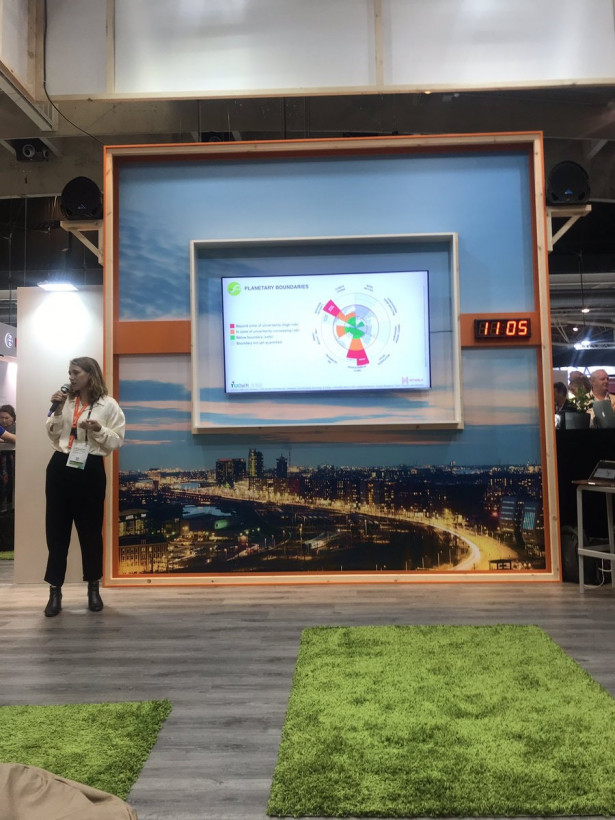
What is your definition of a smart city?
A smart city is a city that uses open data to facilitate the circular economy. A smart and circular city is powered by renewable energy, with clean air and motorless transport. In a smart city, materials are tracked, collected, and reused or repurposed. A circular city goes beyond pollution, recycling, and energy, however, and the city should be integrated with the hinterland by means of nature reserves and green connections to maximize biodiversity within and without. Communities should be tight-knit, diversity is celebrated and communication between different social groups should be frictionless.
Metabolic's vision of a circular city is shaped by our vision of the circular economy. This ideal drives our work with municipalities, cities, regions and countries to accelerate the transition to a broader circular economy. We have worked with multiple cities including Rotterdam, Charlotte, Copenhagen and Amsterdam amongst many others.
What would you like to showcase in Barcelona?
Our objective to go to Barcelona is to meet likeminded people and get inspired by great projects. We would like to showcase the Metabolic Circular Cities Program, which brings cities together around high-impact areas, to drive focused action and stimulate shared learning. By 2050, 70% of us will live in cities. To meet the challenges of today and prepare for tomorrow, cities must rapidly embed sustainable approaches into their development. The ‘Metabolic Circular Cities Program’ – focused on spatial planning – will bring together European cities to accelerate the transition to becoming inclusive, regenerative, and circular.
At the Smart City Expo Barcelona, you can find Metabolic, Amsterdam Smart City and other Dutchies a lot at the Dutch Pavilion. Street D, Stand 473.
Do we see you there?
Impact Hub Amsterdam launches report on pioneers of a sustainable food system
In the "Koplopers van de Korte Keten" (Pioneers of the Short Food Chain) report, five leading-edge Dutch pioneers of the short food supply chain discuss their drive and mission. The founders of De Melkbrouwerij, Herenboeren, Boerschappen, Vokomokum & Atlantis Handelshuis are using innovative, short-chain business models to build a fundamentally different system.
Read the report here: http://bit.ly/IHA-FoodChainReport (NB: in Dutch with English summary)
Pioneers of the Short Food Chain was created with the support of the Ministry of Agriculture, Nature and Food Quality, and Stichting DOEN.
JOIN IMPACT HUB'S FOOD ECOSYSTEM
This report is part of Impact Hub Amsterdam's Food Ecosystem. The Netherlands is the second largest exporter of agro-food products worldwide. What if we used this position to make a real impact across the food chain and accelerate the transition to a more sustainable food system? In this ecosystem, we bring together and strengthen relationships between entrepreneurs, investors, government, corporates and other organisations through events, programs and publications. Together we boost innovation and create the resources for positive change in the food sector. Read more about our Food Ecosystem at http://bit.ly/IHAFoodEcosystem
**** Do you have a good business idea for a more sustainable food system? Pitch it for the Fix Your Food Hackathon in January and win free startup training to make it reality! > http://bit.ly/FixYourFood ****
The Whole Package: Innovations in Food Packaging

Explore trends in sustainable food packaging, innovations & partnership opportunities at Impact Hub, with Futureproof.community.
About this Event:
How can we make food packaging sustainable? Plastic waste is a global problem, and the EU is preparing the transition towards a circular economy. Where does that leave food packaging? During this event, we will explore trends, innovations and opportunities, together with Futureproof.community by MVO Nederland.
For whom?
This evening is for innovation-seekers and makers. We will discuss success stories and do some live matchmaking, especially to make it easier for established companies and smaller innovative parties to find and talk to each other. You’ll meet and learn from entrepreneurs and innovators from our Food, Plastics, and Circularity Ecosystems and be able to start new collaborations.
Speakers
The warming up will be a panel interview, moderated by Caroli Buitenhuis of Green Serendipity, expert on bioplastics, circular economy and sustainable packaging. Chocolatemakers, Willicroft and People of Tomorrow will share their journey towards a sustainable package for their products.
Keynote speaker of this event will be Willemijn Peeters, founder of Searious Business, who helps (food) businesses to become plastic-free and circular. Her mission is to help transform our global economy and is an expert in bringing about organisational strategy & operational change.
Programme
19:00 Walk-in
19:30 Start
20:30 - 21:00 Matchmaking Drinks
About Futureproof.community:
You want to engage in more sustainable business, develop and move forward. For that, you need a product or service, knowledge or that one connection. Futureproof.community by MVO Nederland supports your search for the perfect match. For our 10.000 members, we already made over 4000 matches, so let us have a look at your entrepreneurial challenge! Do you want to know how it works? Watch this video.
About Impact Hub’s Food Ecosystem:
The Netherlands is the second largest exporter of agro-food products worldwide. What if we used this position to make real impact across the food chain and accelerate the transition to a more sustainable food system? Through our ecosystem approach, we bring together and strengthen relationships between entrepreneurs, investors, government, corporates and other organisations. Together we create innovation and resources for positive change in the food sector.
Fail Forward | Circular Edition

Only 9 per cent of the global economy is currently circular while adopting circular principles now could bring Europe net benefits of EUR 1,8 trillion by 2030. That is why Impact Hub Amsterdam hosts events, builds communities and runs acceleration programs around circularity. The next event on circular will be Fail Forward!
We believe that failure and experimentation are essential to developing innovative businesses that make a real impact. For the Circular Edition of our Fail Forward events, we are inviting circular impact entrepreneurs to share what they’ve learned from what went wrong. Listen to inspirational stories, get encouraged and leave with hope on the horizon ; )
Fail Forward line-up:
Speakers include Tiemen ter Hoeven of Roetz, Tynke van den Heuvel of Studio WAE and Dirk van der Beek of Boeren van Amstel.
Programme:
19:30 Registration & drinks
20:00 Speakers & Q&A
21:30 Drinks
Fail Forward is part of The Impact Days and is organized in partnership with the Province of Noord-Holland.
Nieuw: publicatie RECURF-UP - Een nieuwe bestemming voor textiel afval
Textielresten die niet meer te gebruiken zijn belanden nu vaak in isolatiematerialen, in paardendekens of in de verbrandingsoven. De Hogeschool van Amsterdam onderzoekt of er een tweede leven mogelijk is voor ons afval.
Het combineren van oud textiel met biobased plastics levert een materiaal op waarmee bijzondere interieurproducten te maken zijn. De nieuwe uitgave Recurf-Up maakt dit proces inzichtelijk en is kosteloos te downloaden.
Circular smart affordable housing

Proud to be selected by more than 50 professional jury memebers from the international building & construction industry out of more than 1000 spotted startups and 347 entrances.
We had the chance to present our circular tech housing solution to the audience in Frankfurt and made it to the first ever selection of best 100 builtworld startups.
We are the worldwide only CLT modul construction company directly renting out to users. We now focus on temporary locations as that is the best way to enter the otherwise long-lasting and conservative housing development market.
As cross laminated timber just recently gained traction as future proof construction material in The Netherlands and while discussing wood-concrete here, the discussions in Germany were about when.
As CLT experts for more than ten years we are more than willing to look into your housing issue or more impactful circular temporary land use.
Recap Marktverkenning Circulair Innovatie Centrum – Gemeente Amsterdam
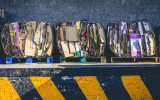
On the 27th of September the kick-off of a market exploration for a Circular Innovation Centre, organized by the City of Amsterdam and Amsterdam Smart City, took place at Pakhuis de Zwijger. The Circular Innovation Centre is a new initiative of the municipality of Amsterdam and aims to facilitate business activities around materials and products that we now call residuals or waste. The idea of the event was to have a conversation with various parties about how we can add value to these material flows and how a Circular Innovation Centre can contribute to ongoing innovation. Read the recap (in Dutch).
De gemeente Amsterdam trapt de middag af met haar ambitie, zij wil in 2050 volledig afvalstoffen vrij zijn. De gemeente benadrukt dat zij andere partijen nodig heeft om haar doel te bereiken. Er wordt in 2050 dus niet meer over afval gesproken maar uitsluitend over grondstoffen. Deze uitdaging wil de gemeente graag samen met verschillende organisaties aangaan, vandaar dat ca. 50 partijen zijn uitgenodigd om hier over mee te praten. Er zijn ongeveer 25 partijen op de uitnodiging af gekomen. Het plan is om de oude milieustraat op de Papaverweg te vervangen voor een nieuwe en deze te verplaatsen naar de Toetsenbordweg. Hier wil de gemeente een Circulair Innovatie Centrum (CIC) creëren waar afval gebracht en hergebruikt wordt. Het CIC moet ruimte gaan bieden voor innovatie, bedrijvigheid en educatie op het gebied van hergebruik en recycling van materialen.
De vraag van vandaag is hoe het nieuwe centrum gerealiseerd en geëxploiteerd moet worden. Gemeente Amsterdam heeft daarvoor drie varianten bedacht:
- Variant 1: De gemeente maakt i.s.m. een architect een ontwerp, laat dat door een andere partij realiseren en gaat vervolgens verhuren (traditioneel).
- Variant 2: De gemeente vraagt een consortium van architect en bouwbedrijf om een ontwerp te maken en te realiseren en gaat vervolgens zelf verhuren.
- Variant 3: De gemeente stelt een uitvraag op om het ontwerp, realisatie en de verhuring door 1 partij of consortium te laten doen.
Ter inspiratie laat de gemeente Amsterdam zien wat de mogelijke uitkomsten zijn als je de markt meer ruimte geeft om een ontwerp te maken, passend bij de ambitie, in plaats van zelf een ontwerp te bedenken.
De case is door studenten van de ROC-opleiding Bouwkunde onderzocht. Zij hadden de opdracht een circulair gebouw te ontwerpen. Bij een landelijke prijsvraag is hun project als tweede beoordeeld. Zij mochten hun ontwerp presenteren aan de aanwezigen. De presentatie werd goed ontvangen: een Repair Cafe uit Amsterdam wil zelfs met de leerlingen in gesprek.
Geïnspireerd door het verhaal van de ROC leerlingen ging de groep aanwezigen in op de vragen van de Gemeente Amsterdam. Belangrijkste vragen van de gemeente waren:
- Hoe moet een CIC er uitzien en waaraan moet het voldoen?
- Wat zijn interessante afvalstromen?
- Welke bedrijven en organisaties zouden zich hier kunnen/willen vestigen?
- Hoe zorgen we ervoor dat er rondom CIC plek blijft voor innovatie en onderwijs?
- Welke kaders zouden er gesteld moeten worden?
- Zijn er partijen die het interessant vinden om de hele ontwikkeling van het CIC op zich te nemen (ontwerp, realisatie en exploitatie)?
De groep dacht actief mee met de Gemeente maar hadden voornamelijk ook veel vragen over een mogelijk Circulair Innovatie Centrum. Zo vroeg men of het slechts bij één CIC zal blijven in Amsterdam en of de verschillende afvalpunten in Amsterdam met elkaar zullen samenwerken. Gemeente Amsterdam geeft aan dat zij de realisatie van het CIC ziet als voorbeeld voor andere punten in Amsterdam, maar misschien ook wel voor heel Nederland.
De belangrijkste uitkomsten en ideeën van deze dag:
- Flexibiliteit in gebruik van het gebouw is belangrijk;
- Afzet creëren is belangrijk, bijvoorbeeld door de Gemeente zelf;
- Locatie en bereikbaarheid van de locatie bepalen mede waar de locatie geschikt voor is;
- Combinatie van bedrijvigheid met opleidingsplek en of/werkplaats;
- Duidelijk zichtbaar maken welke materialen beschikbaar zijn;
- Een opslagfunctie voor materialen zou een goede aanvulling kunnen zijn;
- Het afval dat wordt gebruikt is lang niet altijd geschikt om te hergebruiken omdat het laagwaardig afval is, in tegenstelling tot bedrijfsafval;
- Gemeente moet de regie nemen.
Belangrijkste vragen voor de Gemeente om over na te denken zijn:
- Moet het CIC niet een 'supersorteercentrum' worden, waar mensen de materialen kunnen ophalen, in plaats van een 'gewoon' CIC?
- Hoe kan de Gemeente een aantrekkelijke mix van organisaties in het CIC laten landen en een interessant programma neerzetten rondom afvalstromen en hergebruik?
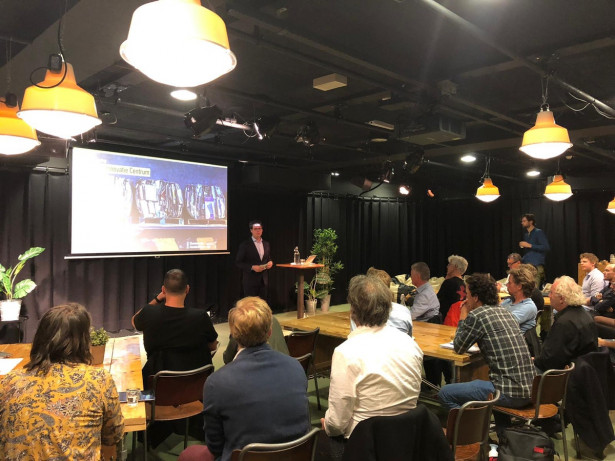
Circular Economy Blog #2 - Food waste

In my last couple of weeks here at Amsterdam Smart City I will present this community a series of interviews on the circular economy with companies here in the Amsterdam Metropolitan Area.
In this second post I will introduce you to a company that contributes to one of the building blocks of the City of Amsterdam: to minimize food waste from retail, catering and household.
In a circular economy, food waste should be minimized to avoid the excess production of food and minimize environmental impacts. In the Netherlands we throw away around 105 kg food per capita a year. The company I present today offers a solution to this problem.
I would like to introduce you to Too Good To Go, a Danish company that started in the Netherlands in January 2018. For this interview I spoke to Sharonne. She works as public relations specialist at Too Good To Go for five months now and can tell us everything about it.
For which problem is Too Good To Go a solution and how started it?
Sharonne: 'We are an application for your mobile device and we fight food waste, by bringing people together. On our app companies such as restaurants, supermarkets, bakeries, hotels and other companies are able to sell their daily leftovers. For consumers it is possible to buy these leftovers for a reduced price on our app. On our app, consumers are able to locate companies that offer Magic Boxes and buy these for a fair price. Users of our app purchase a so called Magic Box, with a surprise of products approaching the expiration date.
Actually the concept is really easy and sometimes gives you the feeling of if only I had thought it myself. It all started in Denmark, with four friends that went to a restaurant. They saw that the restaurant had to throw away a lot of food at the end of the day, they asked themselves how they could prevent this. The students asked the restaurant manager that if they thought of something that helps to reduce their food waste if he will join them. This is how the first partnership started and how Too Good To Go was established. Meanwhile Too Good To Go is active in 13 countries and number 14 is upcoming.
We are able to expand this quick because of the win-win-win situation. At Too Good To Go there are always three different winners. Consumers that enjoy a meal for a reduced price, store owners that earn some money from things they otherwise would have thrown away and the environment. The environment is the biggest winner, by saving all meals a lot of CO2 emission is prevented.'
How does it work exactly?
Sharonne: 'If you open the application on your mobile device you get a list or a map which shows you locations that offer their daily leftovers or their excess food. If you have made your choice you can buy a Magic Box and you get a time frame in which you have to pick up the box. First it started as an initiative with stores that offered their Magic Boxes at the end of the day, but now we see that almost every time of the day the boxes are available. In the morning for example you can already pick up a Magic Box from a restaurant around closing time and in between you can see what the local juice bar or bakery offers.
The Magic Box consist of food that approach their expiration date, so the content of a box depends on the time of day, the provider of the box etc.
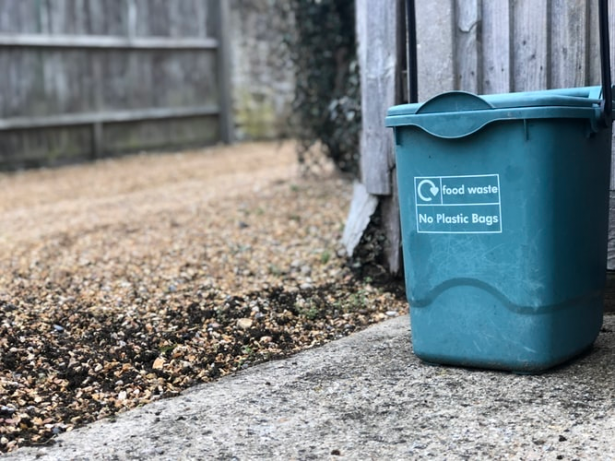
How do you and your partners contribute to a circular Amsterdam?
Sharonne: 'We get some of our partners indirectly through other partners who told them our app really works, or store owners read about it in the media or used our app themselves, but we also have to do some acquisition. The bigger we get the easier it is for us to show companies that our app really works against food waste and that they can earn a little money for products they would have thrown away otherwise.
We are more than an app, we are a movement against food waste. To reduce food waste it is important to raise awareness among companies. We offer them a simple and accessible solution, the more people join us the more impact we create. Per organization we look at the process, what are they already doing, and try to fit Too Good To Go in to the process. However the concept of Too Good To Go is designed in a way that a store owner can continue its working method.
Together with our partners we just saved our millionth meal in the Netherlands and we are still counting. But this is not the only way we try to contribute. We are known because of the app, but in addition we also want to raise awareness for food waste in general. This is why we launched our movement website, here you can find information and test your knowledge about food waste. But it will also provide teaching material for schools or provide entrepreneurs with political information on food waste. So we try to inspire and raise awareness among consumers and business here in the Netherlands.'
Your question for the community?
'What is your best tip to prevent food waste?'
Make sure you read my first blog here
Solutions for the nitrogen emissions crisis
The nitrogen emissions crisis has seen as many as 18,000 construction and infrastructure projects stall across the Netherlands, and hundreds of farmers protesting in their tractors. But nitrogen impacts represent one of the greatest threats to our planetary life support systems, with big consequences for biodiversity and climate change.
So, why are nitrogen emissions a problem in the first place? Is the issue primarily related to construction, farming, or something else, and how do we fix this?
Our Industries team lead Pieter van Exter undertook some detailed analysis and outlines potential pathways out of the crisis.
Biologisch Tuinieren in de Stad
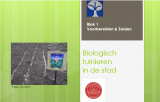
Voor alle nieuwe stadsboeren wordt een starterscursus gegeven over Biologisch tuinieren in de Stad. Op drie avonden in het voorjaar van 2020 leer je alles over zaaien, verzorgen en oogsten van biologisch voedsel. Bij de afsluitende praktijkproef op de Hoeve Klein Mariëndaal in Arnhem kun jij ook het stadsboeren certificaat verdienen. Voor meer informatie kun je terecht op: www.learningisgrowing.nl
Stay up to date
Get notified about new updates, opportunities or events that match your interests.

